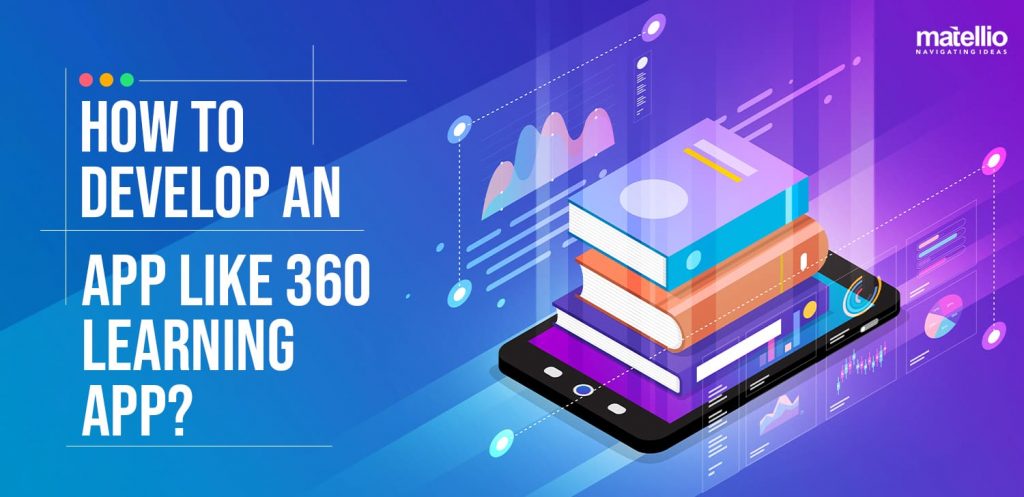
Learning management apps are valuable solutions in a rapidly evolving educational landscape where technology seamlessly integrates with pedagogy. These apps empower institutions, organizations, and individuals to deliver engaging and personalized learning experiences, transcending geographical limitations.
The worldwide e-learning industry is expanding at a 14% annual rate.
Therefore, if you’re considering learning management app development, the right moment is now.
Learning management enterprise solutions like 360 learning apps have transformed how information is communicated and acquired by combining digital technology with successful instructional practices.
However, the development of a learning management app involves:
- Meticulous preparation.
- A thorough comprehension of user requirements.
- The know-how to design an easy-to-use interface.
Whether you’re an entrepreneur venturing into the edtech industry or an educator seeking to enhance the learning experience for your students, this blog will serve as your comprehensive guide.
So, let’s get started!
What is a 360 Learning App?
It’s a potent learning management system app (LMS) that redefines the learning experience for both individuals and businesses is the 360 Learning App. The app provides a comprehensive and user-friendly platform for interactive and collaborative learning by seamlessly fusing state-of-the-art technology with pedagogical knowledge.
Educators and content creators are able to use the app’s robust capabilities to build and administer courses effectively. It provides a variety of choices for uploading various materials, including videos, presentations, quizzes, and evaluations. With its user-friendly course authoring interface, teachers are able to organize their content, establish learning goals, and involve students with interactive features.
Is Investing in a Learning Management App like the 360 Learning App Worth It?
Technology breakthroughs that have changed how we learn and instruct are causing a rapid evolution in education. The need for cutting-edge learning management software has increased along with the growth of online education.
According to World Economic Forum (WEF) research, the COVID-19 pandemic resulted in school closures for more than 1.2 million children in 186 countries in April 2020. The crisis significantly affected the educational sector, which increased the need for online learning systems.
Let’s delve into the potential benefits and considerations that can indeed help you make an informed decision: –
Embracing the Future of Education
By investing in learning management system app development, you put yourself at the fore of the evolution of education. Learners increasingly seek digital enterprise solutions that provide flexibility, personalization, and exciting learning opportunities as technology develops.
The worldwide market for learning management systems app was forecasted to be worth US$ 15.88 billion in 2022, it’ll reach a compound annual growth rate (CAGR) of 18.9%.
Developing a learning management app like the 360 Learning App provides a platform that caters to these evolving needs, paving the way for educational innovation and staying ahead of the curve.
Personalized Learning Experience
Offering individualized learning experiences is one of the most important benefits of learning management software. Adaptive algorithms are used in apps like the 360 Learning App to assess learner data and offer personalized recommendations.
An AI-based learning management app will assist students in grasping concepts, selecting courses, and offering feedback to help them improve their grades will be created using artificial intelligence (AI). Other technologies, including data analysis, evaluate students’ thought processes and learning preferences based on their daily interactions, enabling instructors to provide individualized instruction and a specialized learning environment.
Personalization improves learner happiness, engagement, and information retention. Investing in a learning management system enables you to meet learners’ varied requirements, enhancing instruction’s effectiveness and impact.
Scalability and Cost Efficiency
Scalability and cost-effectiveness are two issues that traditional educational approaches frequently encounter. Enterprise mobility services like learning management apps offer a solution by facilitating easy scaling. Without being constrained by physical infrastructure, you surely can increase the scope of your educational offerings by reaching a worldwide audience. A well-made learning management system app also lowers the expenses related to conventional training techniques, such as printing materials or leasing physical facilities.
Streamlined Administration and Efficiency
For educational institutions and organizations, learning management apps streamline administrative tasks and improve operational efficiency. LMS app development offers the opportunity to integrate course management, content creation, learner tracking, and reporting features within a single platform. The centralization simplifies workflows, reduces administrative burdens, and empowers educators and administrators to focus on creating engaging learning experiences.
Read More: eLearning App Development – How to Create an App like Quizlet?
Key Features to Consider When Building a Learning Management App Like 360 Learning App!
Since you aim to create an e-learning app like the 360 Learning App, some essential features to consider include:
Customizable Dashboards
Allow users to customize their dashboards, including students and teachers, based on their preferences. With the help of this functionality, students will be able to access their courses, check their progress, and see future assignments, while instructors are able to manage their courses, keep an eye on their student’s progress, and create reports.
Course Creation and Management
A good learning management system should make it simple for teachers to design and administer courses. Include a feature that lets teachers upload course materials, arrange lessons and modules, establish due dates, and make evaluations. Additionally, the app should enable the inclusion of multimedia material, such as presentations, videos, and interactive tests.
Progress Tracking and Reporting
To evaluate students’ performance and pinpoint areas that require improvement, tracking their development and producing thorough reports is essential. Implement this functionality that helps teachers monitor students’ progress, examine completion rates, evaluate quiz outcomes, and produce in-depth reports for specific students or the entire class.
Content Authoring Tools
These tools make it simple for teachers and subject-matter experts to develop and edit course materials. With an all-inclusive content authoring functionality, they will quickly add interactive features, exams, and multimedia elements. The material production process is streamlined by this feature, which also guarantees that the courses are current and pertinent.
Communication and Collaboration
Encourage productive communication and teamwork between students and teachers. Learners are able to communicate with instructors, ask questions, and participate in peer-to-peer conversations thanks to features like discussion boards, chat capabilities, and message systems. As a result, the learning process as a whole is improved, and a collaborative learning environment is fostered.
Mobile Compatibility
Ensuring your learning management system app is mobile-compatible is essential in today’s mobile-driven society. Design a responsive website that can easily adjust to various screen sizes and resolutions. It enables teachers and students to use their smartphones or tablets to access the app whenever and wherever they choose.
Advanced Assessment and Certification
Use various assessment methods, including tests, assignments, and project submissions, to correctly measure learners’ progress. When a course is over, give out certificates or badges to acknowledge the students’ accomplishments and encourage them to keep learning.
Gamification
Add gamification functionality to the curriculum to enhance the learning process. Include this feature that encourages participation in the learning process, such as leaderboards, leader badges, awards, and points systems.
Also Read: Gamification in eLearning: An Overview
Assessment and Feedback
This functionality enables teachers to design quizzes, tasks, and tests. Different questions kinds, such as multiple-choice, essay, and interactive forms, should be supported by the app. Additionally, make it possible for teachers to provide students with timely feedback so they easily identify their strengths and areas for development.
Personalized Recommendations
Implement a smart recommendation engine that proposes pertinent courses or study materials based on the learners’ preferences, performance history, and interests. This function improves the tailored learning experience and assists students in finding new areas of interest.
Personalized User Profiles
Giving students the ability to design their profiles improves their educational experience. They’re able to personalize their learning routes depending on their interests and ability levels, track their progress, establish targets, and set goals. Personalization encourages a sense of ownership and spurs users to use the platform more frequently.
Robust Security and Privacy Measures
By putting in place industry-standard security measures, we will be able to maintain the privacy and security of user’s data. Students will have more faith in your app and feel more secure knowing that their personal information is protected if sensitive data is encrypted, secure authentication is used, and data protection standards are followed.
Multilingual Support
To appeal to a worldwide audience, provide multilingual support in your learning management system. This improves inclusivity and accessibility by enabling users and teachers from many locations to use the platform in their language.
Analytics and Insights
Integrate powerful analytics and reporting capabilities to give students and teachers insightful information about their progress. Analytics should contain information on student engagement, assessment performance, course completion rates, and overall learning efficiency.
As you’ve seen the benefits and key features that you need to consider during 360 learning app development; now, let’s discuss,
How to Develop an App Like 360 Learning App?
Following are key steps that you need to take to build a robust app like 360 learning app: –
Define Your Goals and Target Audience
Establishing your objectives and pinpointing your target market is critical before beginning the learning management app development process. LMS developers should consider who will benefit the most from your app and what function it will fulfill.
The general course of your app development journey will be determined by your goals and target audience.
 Conduct Market Research
Conduct Market Research
The success of your custom 360 learning app development depends on rigorous market research, which is crucial. Examine current educational applications like the 360 Learning App to determine their advantages and disadvantages. You’ll be able to differentiate your app and provide customers with exceptional value with the aid of our study. You are able to make wise choices during the development process if you are aware of consumer preferences and market trends.
 Create a User-Friendly Interface and Design
Create a User-Friendly Interface and Design
The user interface (UI) and user experience (UX) are critical impacts in the success of any app. Aim to create a user-friendly interface that is intuitive and visually appealing. Keep the design clean, simple, and consistent throughout the app. Pay attention to navigation, ensuring that users can easily find and access different features and content. Strive for an engaging user experience that motivates users to explore the app further and fosters an enjoyable learning environment.
 Choose the Right Technology Stack
Choose the Right Technology Stack
Choosing the appropriate technology stack is essential for creating a reliable and scalable 360 learning app. Decide which platforms, such as iOS and Android or both, you wish to target. Investigate several frameworks, tools, and programming languages that are appropriate for creating your project. When selecting a technology, keep things like performance, community support, and pace of development in mind.
 Develop and Test the App
Develop and Test the App
It’s time to begin the development process after establishing the objective, functionality, interface, and technology stack. Start with developing an MVP that consists of your app’s essential features. This enables you to get input from early adopters and make the required adjustments. To guarantee a dependable and bug-free application, conduct thorough testing at each development step.
 Implement a Secure Backend and Database
Implement a Secure Backend and Database
For an app like 360 Learning, a secure backend and a well-structured database are crucial components. Develop a robust backend architecture that can handle user authentication, data storage, and retrieval efficiently. Implement proper security stabndards to protect user data and ensure compliance with privacy regulations.
Conclusion
Learning management app development like the 360 Learning App can be an exciting and fruitful endeavor. You are able to begin along the path to building an influential platform that transforms training and education by taking the crucial steps we covered in this blog.
Remember that developing an app needs rigorous planning, solid architecture, fascinating features, and a user-centric approach. You are able to conquer the challenges of app development and realize your vision if you have the correct team of specialists and a trustworthy LMS development company.
When it comes to finding a competent eLearning app development company for your learning management app, Matellio emerges as a top choice. With our expertise in LMS app development and our commitment to excellence, Matellio can provide you with a cutting-edge solution that meets your unique requirements.
Our talented team of developers, designers, and QA professionals work tirelessly to ensure your app exceeds expectations. By choosing Matellio, you can indeed be confident in the quality, scalability, and performance of your learning management app.



 Conduct Market Research
Conduct Market Research Create a User-Friendly Interface and Design
Create a User-Friendly Interface and Design Choose the Right Technology Stack
Choose the Right Technology Stack Develop and Test the App
Develop and Test the App Implement a Secure Backend and Database
Implement a Secure Backend and Database


